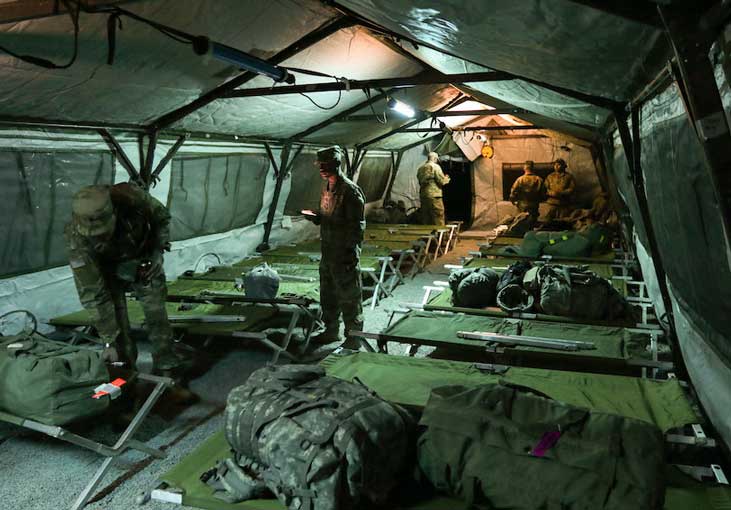How well and how long you sleep is essential to military health, wellness, and performance. Most adults should get 7–9 hours of sleep every 24 hours. But about 70% of Service Members get less than 6 hours of sleep per night, compared to only about 30% of the general population who get less than 6 hours per night.
Service Members who are sleep deprived don’t perform as well mentally or physically. Sleep-deprived Service Members also have a higher risk of getting musculoskeletal injuries and making errors that can affect personal and mission safety. But when sleep improves, performance and health improve too. As a military leader, you can show Service Members you support the value of getting enough sleep.
The role of leaders in helping optimize sleep readiness
A report (PDF) to the Congressional Armed Services Committees recommends DoD establish a policy to promote a culture shift that better prioritizes Service Members getting enough sleep. Leaders can play a vital role in this culture shift, and strong “sleep leadership” can help.
Sleep leadership is the quality of leaders who:
- are aware of the impact of sleep on health and performance,
- know what healthy sleep habits look like,
- practice good sleep habits, and
- encourage their team members to do the same.
Service Members get better sleep in terms of quality and quantity when their leaders show strong sleep leadership.
Efforts to improve sleep readiness have gained traction among senior military leaders, policy makers, educators, researchers, and funding agencies. But additional change won’t come until leaders continue to learn, develop, and “walk the talk” in sleep leadership skills.
How to improve sleep leadership
As a military leader, you can take specific actions to improve your sleep leadership. Here are some practical ways to do that.
Build relationships
Leaders with strong sleep leadership establish individual relationships with their team members and manage them in a way that prioritizes sleep.
- Ask Service Members about the quality and length of their sleep.
- Encourage team members to make sleep a priority.
- Create a culture that destigmatizes Service Members’ need to get enough sleep.
- Help Service Members address factors that might impact their sleep, such as work-related stress or bad sleep habits.
Provide education
Strong sleep leadership also focuses on learning and sharing information on sleep readiness optimization. Be ready to share information to help Service Members improve their sleep as issues come up during regular check-ins.
- Have individual conversations and team training about the impact of sleep on Total Force Fitness.
- Encourage Service Members to develop good sleep habits.
- Educate Service Members on the different types of strategic napping.
- Train Service Members on operational fatigue management.
Plan around sleep needs and allow flexibility
When you’re able to, create schedules that allow Service Members to get enough sleep. It isn’t possible to train for sleep deprivation, so the best way to lessen the impact is to support Service Members getting enough sleep whenever possible.
- Allow enough time for sleep, rest, and recovery before, between, and after all missions.
- Consider—and discuss—the impact of circadian rhythms on performance. When possible, create schedules that prioritize staying alert during the day, and getting at least some night-time sleep.
- Try to schedule Service Members for long-term shifts rather than in constant rotation.
- Delay PT until the afternoon on days before shift work and night operations so Service Members can get extra sleep in the morning.
- Allow enough time for Service Members to bank sleep hours and pay off sleep debt before and after night and sustained operations.
- Keep in mind that Service Members might need a few days to return to a night-time sleep schedule after being on night shifts for several days.
- Encourage short naps during night- and sustained operations, when possible.
Create a supportive environment
Leaders with strong sleep leadership make changes, when possible, to create an environment that supports good sleep on military installations.
- When possible, help control noise, light, and temperature to optimize Service Members’ quality and length of sleep.
- Consider roommates or tentmates when planning shift schedules and assigning duty, so one Service Member doesn’t wake up others.
Encourage medical support
Suggest that Service Members get medical support when needed. Insomnia and sleep apnea are common sleep disorders in the military, and Service Members with these conditions should get help from a specialized healthcare provider.
- Consider the possibility of insomnia when poor sleep doesn’t improve by implementing better sleep habits. Service Members with insomnia significantly improve with cognitive behavioral therapy for insomnia (CBTi).
- Encourage Service Members who complain of extreme fatigue, loud snoring, and gasping for air during sleep to see a healthcare provider. These are signs of sleep apnea, which can lead to other medical problems.
Lead by example
Leading by example is a core component of strong sleep leadership.
- Serve as a role model for your unit and team members by prioritizing and implementing healthy sleep habits for yourself.
- Share personal stories highlighting your motivation to prioritize sleep, roadblocks you’ve faced, and solutions you’ve implemented along the way.
To keep learning about sleep readiness, visit HPRC’s Sleep & Stress section. HPRC also offers training on sleep-related topics. Contact the HPRC team at HPRC@usuhs.edu.
